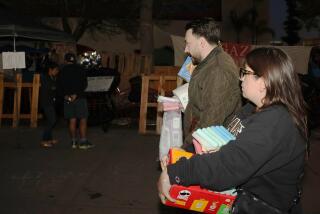Diane J. Lipton, 57; Daughter’s Disabilities Led to Advocacy
Diane J. Lipton, a California mother whose frustrations over the public schooling of her severely handicapped child led her to become a prominent national advocate for the disabled, died Aug. 8 of cancer at her home in Richmond, Calif. She was 57.
Lipton was a program director for the Disability Rights Education and Defense Fund, a Berkeley-based national law and policy center dedicated to protecting and advancing the civil rights of people with disabilities.
She became a crusader for disabled children more than 20 years ago when she successfully fought Contra Costa County’s Richmond school district to put her daughter in the same classroom with non-handicapped students.
Needing more resources to continue the fight on behalf of other children, she enrolled in night law classes and became a lawyer. She later played a central role in a groundbreaking 1990 case against the Sacramento city school system that affirmed the right of a mentally retarded student to attend regular classes full time.
Her combination of legal training and personal experience made her a formidable advocate, colleagues said.
“She was an icon to the disability movement,” said Linda Shepard of the United Parent Syndicate on Disabilities, a national group. “As a parent herself, she helped pave the way for so many other parents to ... get their children with disabilities the services they needed.”
“No one had her breadth of experience,” said Arlene Mayerson, a lawyer for the Disability Rights Education and Defense Fund.
Lipton was born and raised in New York City. She moved west to attend UC Berkeley, where she earned a bachelor’s degree in English. After graduating, she taught at Berkeley High School.
Her daughter Chloe was born in 1972 with multiple disabilities, including cerebral palsy, mental retardation and a seizure disorder. Lipton quit teaching to care for her, eventually returning to school to earn a master’s degree in rehabilitation counseling.
Chloe began attending a special public school for the orthopedically handicapped when she was 3. In 1979, when she was 7, the district tried to reduce the occupational therapy services it was required to provide by law. Lipton enlisted the help of disability rights lawyers, who found that the district was out of compliance with special education laws on a variety of fronts.
A child of the 1960s who participated in the youthful protests of the era, Lipton gradually formed a broader view of the problems in Richmond as “an infringement of her daughter’s own civil rights,” Julia Landau wrote in a 1990 article on the case.
During the school day, the only glimpse Chloe had of non-handicapped children was through the chain-link fence separating her campus from the regular school. The only time of year when the children were allowed to mingle was on Halloween for the costume parade.
“Diane would always tell that story,” said Mayerson, a friend for two decades. “To her that symbolized the whole picture of what was going on there. She thought that meant [school officials] saw them as freaks because it was only when everyone was allowed to be freaks that they were together.”
Believing it was detrimental to her daughter to have no interaction with non-disabled peers, Lipton began to pressure district officials to end the segregation and rallied the support of other parents. Over the next several years, lawyers for the Disability Rights Education and Defense Fund successfully blocked the dispersal of more than $70 million in federal special education funds to California until the inequities were addressed.
The fight ended with the closing of Richmond’s campuses for the disabled and the integration of the students into mainstream classes.
After her success in Richmond, Lipton enrolled in night classes at Golden Gate University School of Law in San Francisco. She went on to serve as one of the lead attorneys who helped win a historic victory for public school children with disabilities in Holland vs. Sacramento City Unified School District.
The case established the right of Rachel Holland, an elementary school student with Down’s syndrome, to attend a regular public school.
In June, Rachel graduated from high school, where she sang in the choir and studied science, reading and other subjects alongside non-disabled peers.
“I say Diane saved our daughter’s life,” said Kim Connor, Rachel’s mother. “She would not be who she is today had Diane not broken down the schoolhouse door for her.”
Lipton was diagnosed two years ago with a rare form of lung cancer not associated with smoking. She continued to work on cases even as her illness worsened last week.
Three days before she died, she was writing a long memo on her laptop computer about issues at stake in the Ravenswood school district in East Palo Alto.
Her daughter Chloe is 30 and living on her own, with some outside assistance, in the Bay Area community of Emeryville. Lipton is also survived by her husband, Jim Armstrong, and their daughter, Daria.
Memorial donations may be sent to the Disability Rights Education and Defense Fund, 2212 6th St., Berkeley, CA 94710, or to East Bay Innovations, 440 Grand Ave., Suite 425, Oakland, CA 94610.
More to Read
Start your day right
Sign up for Essential California for news, features and recommendations from the L.A. Times and beyond in your inbox six days a week.
You may occasionally receive promotional content from the Los Angeles Times.







